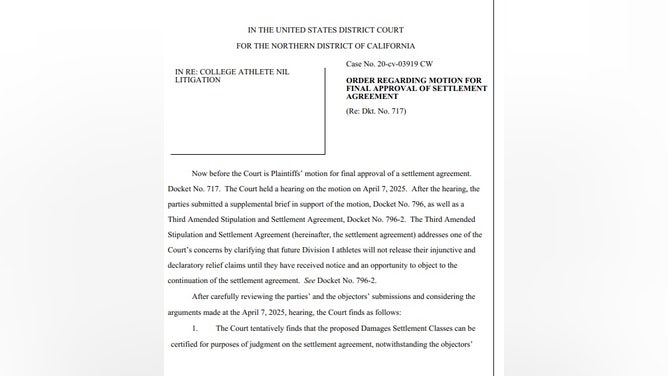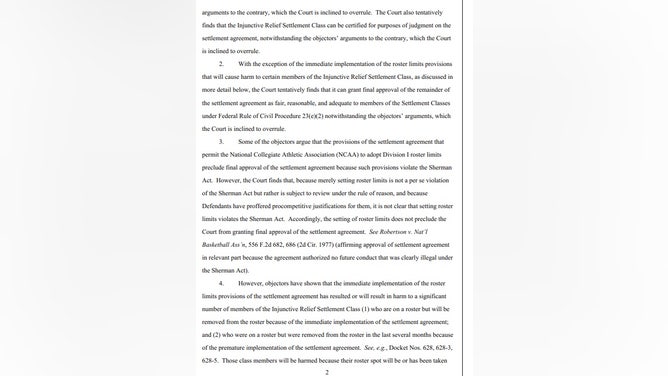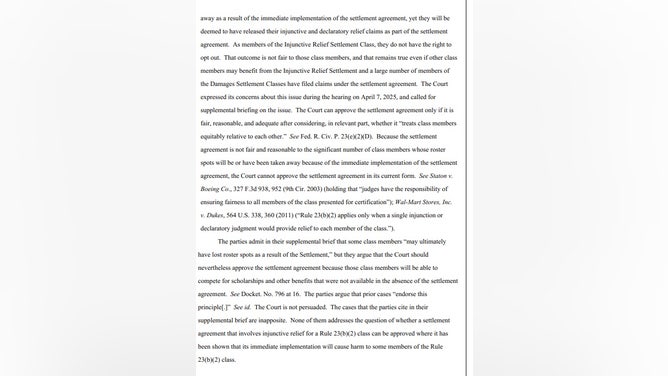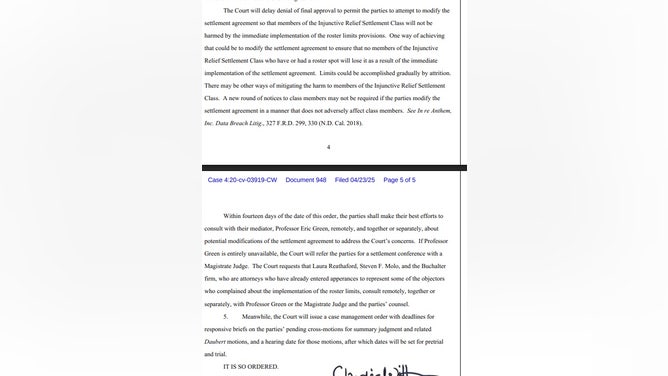Breaking: House V. NCAA Settlement Now Hinges On Roster Limits Being Phased In, Or Judge Will Deny Settlement
After both sides presented Judge Claudia Wilken with an amended settlement structure, the judge in Northern California made it clear in an order filed Wednesday that if roster limits are not grandfathered in for team sports, she will not approve the House settlement.
The order tells attorneys from all parties that they now have 14 days to come up with an amended agreement, or this whole suit will not be settled. After the hearing last month, Judge Wilken's made it clear that she wanted to see roster limits grandfathered in, but after lawyers did not change their stance in a supplemental brief filed recently, it's clear that both sides need to come up with a solution, or this approval will be denied.
"The court finds that the decision by Defendants and NCAA member schools to begin implementing the roster limits before the Court granted final approval of the settlement agreement is not a valid reason for approval of the agreement in its current form," Judge Wilken wrote.
"Any disruption that may occur is a problem of Defendants', and NCAA member schools' own making. The fact that the Court granted preliminary approval of the settlement agreement should not have been interpreted as an indication that it was a certain that the Court would grant final approval."

Judge Wilken will not approve House settlement unless roster limits are not grandfathered or phased in

Judge Wilken will not approve House settlement unless roster limits are not grandfathered or phased in

Judge Wilken will not approve House settlement unless roster limits are not grandfathered or phased in

Judge Wilken will not approve House settlement unless roster limits are not grandfathered or phased in
Judge Will Not Approve House Settlement In Current Standing
Clearly, this judge is not messing around when it comes to the roster limit discussion, which has been a hot-button topic during this ordeal. There is also a bigger problem for players. Right now, athletes across the country have entered the transfer portal at schools, because their current school had to cut back on its roster size.
Jeffrey Kessler, who is one of the attorneys representing the plaintiffs' released a statement on Wednesday evening.
"We are pleased that the Judge had indicated that she has overruled almost all of the objections to the settlement. The one remaining issue is the adverse impact of the roster limits on some injunctive class members. We are going to press the NCAA and the Conference defendants to agree to remedy this issues within the next fourteen days, as the Judge suggested, or else she has made it clear that we are going back to trial."
In the overall agreement, the NCAA agreed to pay $2.8 billion in damages, to current and past athletes. This will settle three different federal antitrust lawsuits. Those suits that would be settled center around the claim that the NCAA has limited the earning potential of the athletes. Right now, NCAA rules limit the number of scholarships each participating team can give to players participating.
Part of the agreement that has sparked conversation centers around the proposal from the NCAA that would limit the number of athletes that a can can keep on its active roster, which is intended to keep the richer schools from just piling up their rosters with talented players. But, this move would lead to many teams having to cut players from the current rosters, which includes walk-ons.
To avoid players being left out in the cold, with no team, Judge Claudia Wilkens' made it clear that all sides needed to work on a plan to have players currently on rosters not be cut immediately, but rather have this take place over a certain time period. Having to make such quick decisions to cut players, just to hit a roster limit by July, has led to backlash within the collegiate sports community.
Right now, under the proposed settlement, football would have 105 spots, basketball would have 15, and baseball would have 34.
This also includes 28 spots for men's and women's soccer, along with 25 spots for softball and 18 for volleyball. Also at the forefront of this argument regarding the settlement is the fact that these limits on roster size will impact walk-ons and athletes on partial scholarships, like those in track & field, swimming and football.
In a statement released to OutKick, attorney Steve Berman, who is court-appointed co-lead counsel in this litigation said the following.
"We appreciate the court’s guidance and thoughtful review of this monumental case. We are pleased that the court has rejected all of the objections but the roster issue, and we will work hard to convince the NCAA and the conferences to address the court’s concerns. If we are unable to do so, then we are off to trial and we will return to fighting the NCAA in court with next steps," Berman noted.
"Our clients — hundreds of thousands of hardworking NCAA college athletes — know that greatness is not achieved overnight, and that results come from years of determination. Our firm brings the same fight to the courtroom as our clients bring to the court, and we are not finished with the NCAA."
Now, when the sides come back before the judge and present a motion to allow for players to be grandfathered in, meaning that they would not have to immediately leave teams, this could lead to major headaches for the schools that have already cut players on the roster.
Also, if players are allowed to be phased in, that would mean that a spot would be available on a team's roster for the 2025-2026 season.
Simply put, all of this has been a cluster for the parties involved, and schools have already made decisions regarding the transfer portal, which is set to close on Friday. Now, there will be a number of players who have had decisions made for them which could end up being ratified.
Right now, conference commissioners are meeting at the CFP headquarters to discuss potential formats for the playoff moving forward. But, there will clearly be another topic discussed over the next 24 hours, as a judge is waiting for a final settlement agreement that includes a solution on roster limits.
If Judge Wilken does not see a change, this settlement will not be approved. This would obviously be a disaster. So, you can expect both parties to try and find a solution, with the clock ticking.